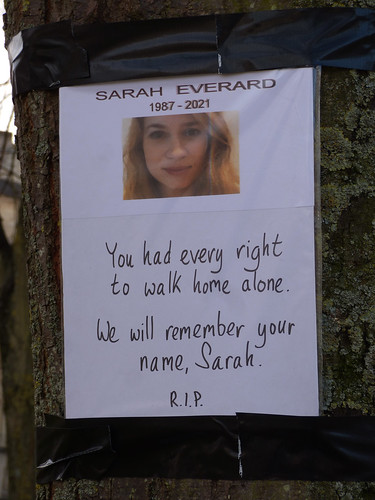Met police pays damages to women arrested at Sarah Everard vigil
Sarah Everard #SarahEverard

Scotland Yard has apologised and paid “substantial damages” to two women arrested during the vigil for Sarah Everard, in a major climbdown following years of legal battles over the policing of the event.
In a move that the new Metropolitan police commissioner, Mark Rowley, will hope draws a line under one of the darkest periods of the Met’s recent history, the force acknowledged that it was “understandable” that Patsy Stevenson and Dania Al-Obeid had wanted to attend a candlelit vigil at Clapham Common because they felt women had been “badly let down”.
The women told the Guardian the apology had been hard-won and was welcome, but vowed to continue to “speak up about police abuse” and fight for better policing of violence against women and girls.
The women both attended the vigil for Everard, who was kidnapped, raped and murdered by a serving Metropolitan police officer, in March 2021, when Covid restrictions on large gatherings were in place.
The image of Stevenson being pinned to the floor by officers as she was arrested sparked widespread fury and distrust among women, while the Met’s actions at the vigil saw it and its then commissioner Cressida Dick widely criticised. A 2021 police inspectorate review into the event called the Met’s conduct “absolutely right”.
The pair launched legal claims against the Met under the Human Rights Act after prosecutors halted attempts by the Met to bring prosecutions against them and four others.
Dania al-Obeid at the vigil following the kidnap and murder of Sarah Everard in March 2021. Photograph: Dylan Martinez/Reuters
On Wednesday, Stevenson expressed relief that this chapter of the “tiring” fight was over, but said that while the apology was welcome, it was “half-arsed”. She added that the controversial Public Order Act had “further eroded and undermined” citizens’ fundamental right to protest.
“Every step has been a huge hurdle, so I appreciate what they’ve said, but […] even if you go through a [legal battle], they still won’t hold themselves accountable for what they’ve done. But this is a very big win for us, and for everyone who attended the vigil.”
Al-Obeid, who was handcuffed and arrested at the vigil, discovered that she had been convicted behind closed doors under the Single Justice Procedure (SJP) only after being contacted by media.
She challenged the conviction on the grounds that she had no opportunity to plead guilty, and the case was then dropped by the CPS and her “crime” removed from the record. She called the apology “empowering”, but said victims of abuse needed more support that could not be provided by the police.
“The police are not the right organisation to be on the frontline for victims of violence. They just end up re-traumatising them,” said Al-Obeid, herself a victim of domestic abuse. “There is a real need for specialised resources to deal with these situations.
“I will continue speaking out about the abuse that goes on in police forces and their lack of support for victims of abuse.”
In letters to the two women from Commander Karen Findlay, the Met acknowledged that even during Covid, their “fundamental right to protest remained”, but noted that the pandemic “presented an extremely difficult challenge for policing and the officers present”. It added: “That aside, I appreciate the anger, frustration and alarm your arrest undoubtedly caused you, exacerbated by the subsequent proceedings.”
Patsy Stevenson said the campaign had been ‘tiring’. Photograph: Martin Godwin/The Guardian
The settlements follow damning findings by the Baroness Casey review into the standards of behaviour and internal culture of the Met. The Casey review said the force had behaved with “characteristic defensiveness, internal focus and lack of humility”, both in the policing of the event and the decision afterwards to pursue those who were arrested and appeal against a decision by the high court that found that it was unlawful for them to have tried to prevent the original vigil.
Anna Birley, who as part of the organisation Reclaim These Streets was told she would face tens of thousands of pounds’ worth of fixed penalty notices and potential prosecution if it went ahead, said she hoped it was the first of many apologies from the Met.
“The ability to admit when you’ve made a mistake and make amends is an important part of changing culture and doing better by London’s women and girls,” she said. “I hope this indicates a fresh approach for the Met and isn’t just a cynical way to avoid an embarrassing loss in court.”
Rachel Harger, a solicitor at Bindmans LLP who represented Stevenson and Al-Obeid, alongside Jude Bunting KC and Pippa Woodrow of Doughty Street Chambers, said the Met had paid “substantial damages” to the women, who had “demonstrated that we protect the right to protest by protesting”.
“They have both overcome significant adversities in their attempts to hold the Met police accountable, and in full public view. I hope other women, particularly survivors of physical and sexual violence, will feel strengthened in their efforts to do the same.”
A spokesperson for the Met said: “The Clapham Common vigil took place in extraordinary circumstances … We tried to achieve a balance that recognised the rights of the public to protest and to express their grief and sadness, while also continuing to enforce the relevant Covid legislation.
“A protracted legal dispute is not in the interests of any party, least of all the complainants who we recognise have already experienced significant distress as a result of this incident.
“The most appropriate decision, to minimise the ongoing impact on all involved, was to reach an agreed settlement.”